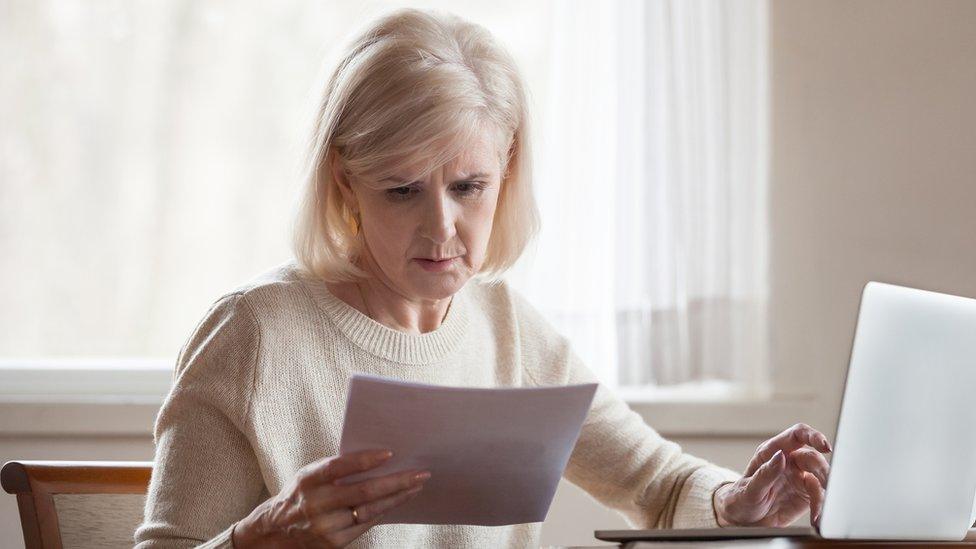Energy bills: 'Trapped in a home I couldn't afford to heat'
- Published
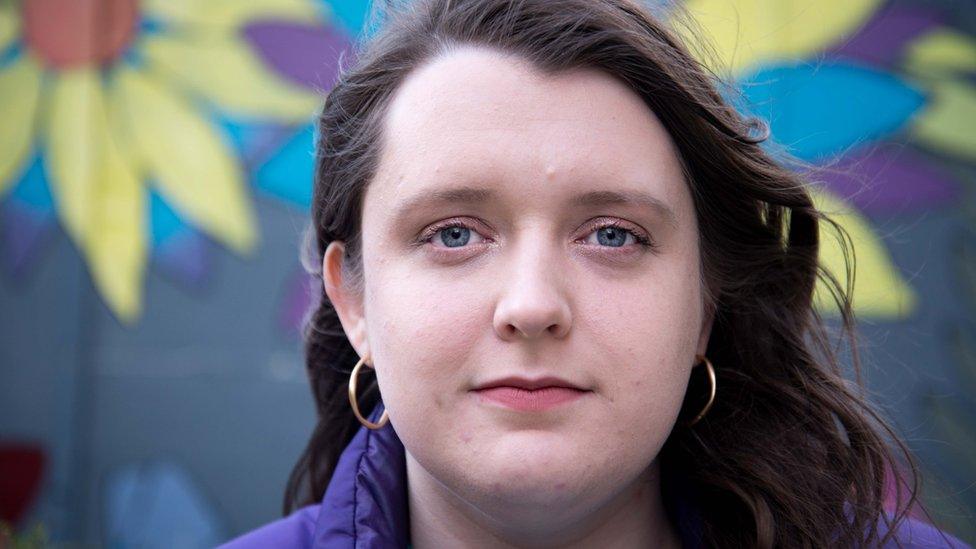
Niamh Oddy says her flat was so expensive to run, she opted to switch the heat off instead
A university student whose Belfast flat was so damp the ceiling plaster fell away in "mouldy chunks" said she felt trapped in a home that was too expensive to keep warm.
Niamh Oddy said she opted to switch off the heat after she and her flatmate lost their jobs due to Covid-19.
And then the damp set in.
In England and Wales, private properties must meet a minimum energy efficiency standard, external, with the aim that renters can afford to heat them.
There are currently no such restrictions in Northern Ireland.
A new bill is working its way through Stormont and will bring Northern Ireland in line with the rest of the UK.
The Private Tenancies Bill, external will set a minimum Energy Performance Certificate (EPC) rating, which will mean that homes cannot be let out if their energy efficiency rating is below an as yet undetermined point.
Organisations say this is key to tackling fuel poverty as the cost of energy continues to rise.
The bill also includes a cap on rent increases to once in 12 months, amending and in some cases extending the notice to quit period which was introduced at the start of the pandemic, and limiting tenancy deposits to one month's rent.
'There was no escape'
Ms Oddy's flat had old electric storage heaters.
She said the dials were broken which meant she could not adjust the settings, so she switched the heaters off.
She told BBC News NI that the agent told them just to open the windows after the ceilings and walls grew mould.
Ms Oddy, who is studying for her master's degree at Queen's University, said: "The ceiling became really damp and then the plaster started peeling off and it would just fall away in really big chunks.
"We complained about this and nothing, so all our stuff was covered in white dust and just this grotty, mouldy plaster.
"It was really depressing. You really did feel like there was no escape. We were paying a good portion of our student loans to live there as well, we had both lost our jobs, we were just scraping by."
They moved out when their lease was up.
She said the rent on the property had since been increased from £580 to £600 a month.
"It was absolutely unliveable and I do regret paying rent on it for so long."
Energy efficiency 'key' to reducing fuel poverty
People switching off their heating, even when it worsens damp, is something National Energy Action (NEA) sees often.
In a case like Ms Oddy's, the tenant could be blamed for mould, even when it is a sign of bigger problems like poor insulation, according to the charity.
NEA's Northern Ireland director Pat Austin said making homes cheaper to run, and better at keeping in the heat, helps reduce fuel poverty.
More than one in four households in private rentals (26%) are in fuel poverty, according to the most recent figures from the Housing Executive, external, carried out in 2016 and published in 2018.
Planning is under way for a further study to be carried out this year.

Pat Austin says there is a new demographic being pulled into fuel poverty
Private renters are also more likely to be in fuel poverty than those in social housing, where the 2016 figure was about one in five.
The charity expects this figure to be higher now the cost of living, and fuel in particular, have risen.
"We know that households are just simply not only rationing their heat, but actually disconnecting from it," Ms Austin said.
She said more people were being pulled into fuel poverty.
"We have seen significant increases in our calls and people who are working and struggling, so the profile is definitely changing and there's just a real depth to the problem."
Inefficient homes 'put people at risk of eviction'
Housing Rights policy coordinator Kerry Logan said inefficient housing affected those least able to afford high energy bills.
"Those relying on housing benefits often live in properties at the cheapest end of the market, where we see the poorest standards," she said.
"This means many of those already struggling financially are forced to pay excessive amounts on heating their homes which, in turn, affects their ability to pay for other essentials, on their ability to pay their rent, and therefore risking eviction.
"All of this is exacerbated by the rising fuel costs and brings into sharp focus the need for minimum energy efficiency standards."
'It's about quality of life'
Queen's University Prof John Barry said retrofitting homes to make them warmer would be the "single biggest benefit" to people here.
In Northern Ireland, more than two thirds (67%) of homes fall into the least energy efficient brackets on energy certificates, according to data analysed by the BBC.
"We've created sub-optimal and sub-standard housing options for our citizens that would not be legal in other parts of the UK, that's the bottom line, and that can be fixed only by legislation," Prof Barry said.
"While it is called energy efficiency standards, it really is about heating, it's about quality of life."
A study by the Belfast Climate Commission, external, co-chaired by Belfast City Council and Queen's University, found that 39% of the city's emissions come from the domestic housing sector.
By making homes more efficient through improvements like double glazing and insulation, the authors suggest the domestic sector could make the single biggest contribution to reducing Belfast's carbon footprint, helping the city reach its net-zero 2050 target.
But that also comes with a cost to the homeowner, Chartered Institute of Housing's Northern Ireland director Justin Cartwright said.
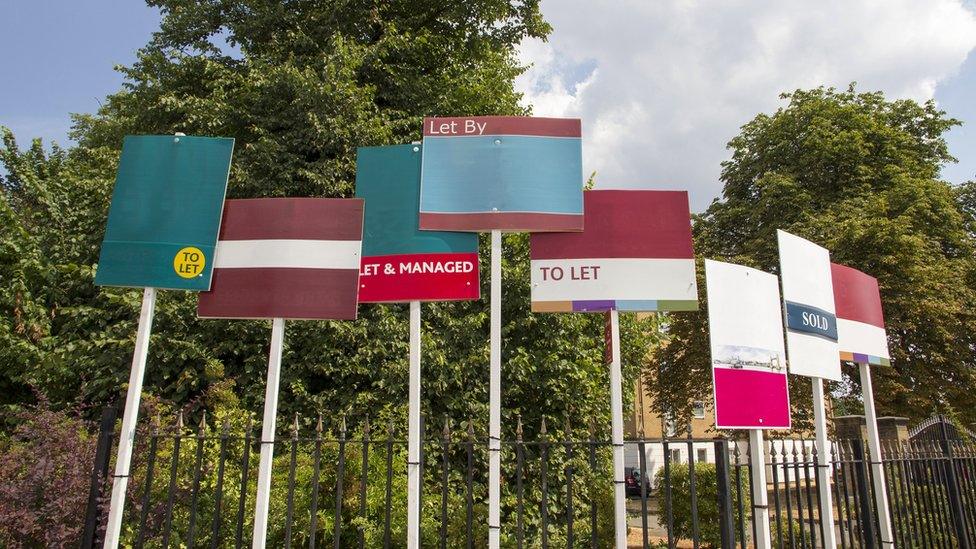
More than one in four households in private rentals were in fuel poverty in 2016
Last week the Irish government announced a €8bn (£6.7bn) retrofit grant scheme to upgrade half a million homes to a B2 energy efficiency rating by 2030, external.
Northern Ireland already has the Affordable Warmth Scheme, external, which provides grants to low income households to install energy efficiency measures and is also open to landlords.
Mr Cartwright said more was needed to avoid low efficiency homes being passed "pillar to post" because of the cost of bringing them up to standard.
"Some of them will retrofit, but what we want to avoid is others saying 'it's not worth my time' and they end up selling it on for someone else to deal with, and then that creates insecurity for the tenants.
"So we need to look at financial incentives."
BBC News NI has contacted the Landlords Association for Northern Ireland for comment.
What next?
The Private Tenancies Bill is expected to be passed by the end of the assembly mandate in March.
When that happens, the Department for Communities will consult with stakeholders to set a minimum standard for efficiency using a home's Energy Performance Certificates, external (EPC).
What is a minimum efficiency standard?
All homes in the UK must get an EPC before they can be sold or rented out.
These measure a home's energy efficiency - things like the type of energy it uses, and how well it is insulated and glazed - and give an idea of the property's typical energy use and costs.
The scale runs from A - most efficient and least expensive to run - all the way to G, which is the opposite.
EPCs have been used in England, Wales and Scotland to set a minimum energy efficiency standard, and the same measure is also proposed here.
In England and Wales, properties have had to have a rating above E to be let out since 2020. The government has also consulted on lifting the minimum to C.
Scotland plans to introduce similar legislation, external.
In Northern Ireland, homes rated least energy efficient can still be rented out.
- Published18 December 2021
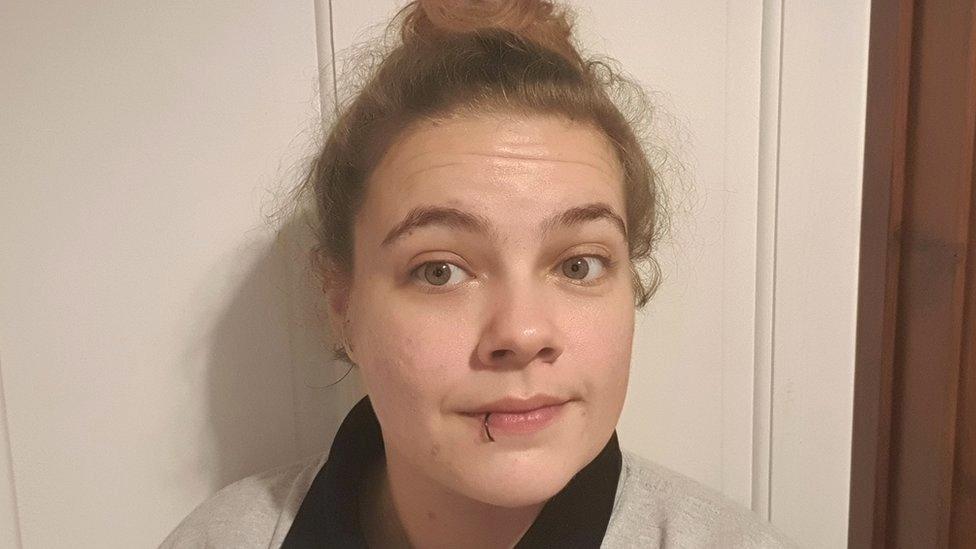
- Published2 March 2020
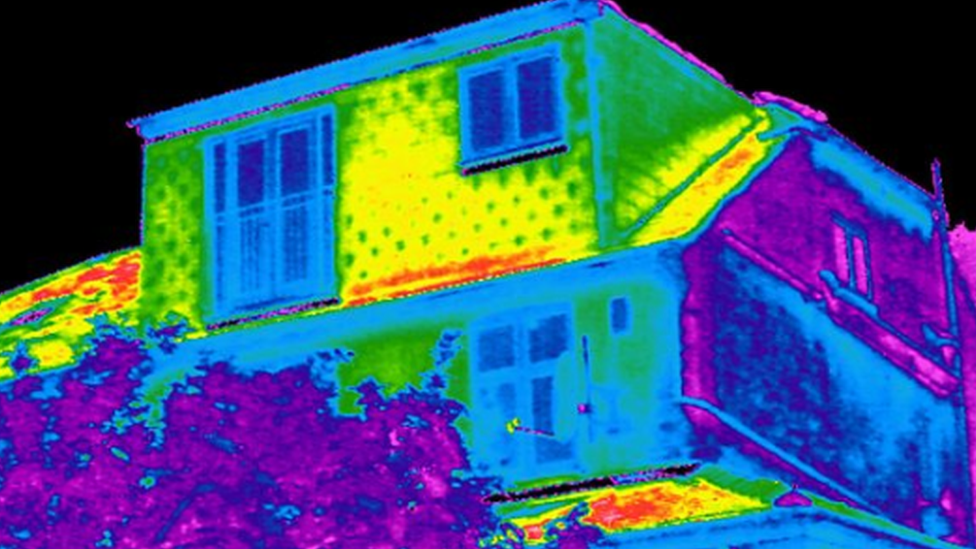
- Published14 June 2022
